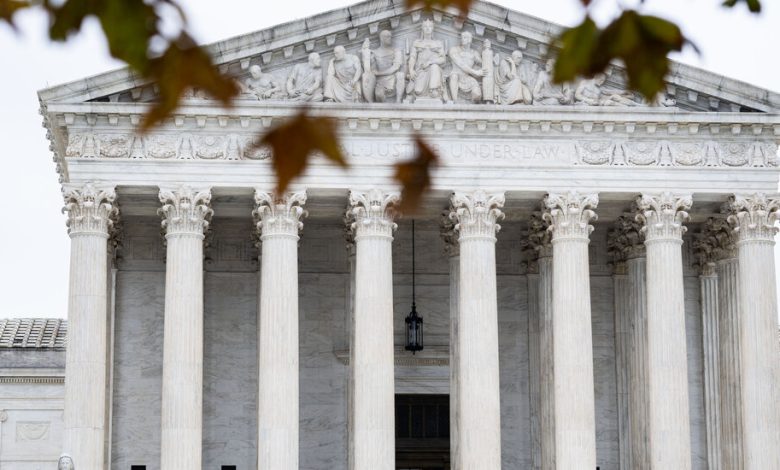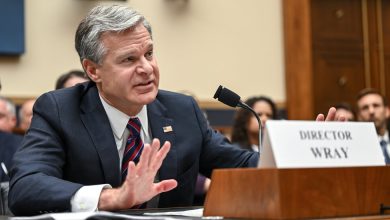Supreme Court Faces Increasing Scrutiny From Congress After Leaks

WASHINGTON — Congressional Democrats are intensifying their critical focus on the Supreme Court in the wake of accusations of leaked decisions and improper outside influence, calling for new ethics rules to be imposed on the justices.
House Democrats plan to convene a hearing on the issue on Thursday. Senate Democrats say they are also considering taking a closer look at the court after disclosures of a concerted campaign by evangelical Christians to develop deep contacts among some conservative justices as they weighed major rulings on religious rights, abortion and contraception.
“There are certainly circumstances that need to be questioned,” said Senator Richard J. Durbin, Democrat of Illinois and chairman of the Judiciary Committee, saying he would not rule out the panel zeroing in on the court next year.
The House Judiciary Committee hearing set for Thursday is titled “Undue Influence: ‘Operation Higher Court’ and Politicking at SCOTUS” and is scheduled to feature testimony from the Rev. Robert Schenck, a former anti-abortion activist turned whistle-blower.
Mr. Schenck told The New York Times he received notice of a 2014 ruling in a landmark religious rights case from a financial patron who had a social relationship with Justice Samuel A. Alito Jr., who wrote the opinion. Justice Alito has denied disclosing the decision. Mr. Schenck also said he had engineered a plan to have wealthy donors try to ingratiate themselves with the justices as a way to build relationships with them and encourage their conservative views.
Understand the U.S. Supreme Court’s New Term
A race to the right. After a series of judicial bombshells in June that included eliminating the right to abortion, a Supreme Court dominated by conservatives returns to the bench — and there are few signs that the court’s rightward shift is slowing. Here’s a closer look at the new term:
Legitimacy concerns swirl. The court’s aggressive approach has led its approval ratings to plummet. In a recent Gallup poll, 58 percent of Americans said they disapproved of the job the Supreme Court was doing. Such findings seem to have prompted several justices to discuss whether the court’s legitimacy was in peril in recent public appearances.
Affirmative action. The marquee cases of the new term are challenges to the race-conscious admissions programs at Harvard and the University of North Carolina. While the court has repeatedly upheld affirmative-action programs, a six-justice conservative supermajority may put more than 40 years of precedents at risk.
Voting rights. The role race may play in government decision-making also figures in a case that is a challenge under the Voting Rights Act to an Alabama electoral map that a lower court had said diluted the power of Black voters. The case is a major new test of the Voting Rights Act in a court that has gradually limited the law’s reach in other contexts.
Election laws. The court will hear arguments in a case that could radically reshape how federal elections are conducted by giving state legislatures independent power, not subject to review by state courts, to set election rules in conflict with state constitutions. In a rare plea, state chief justices urged the court to reject that approach.
Discrimination against gay couples. The justices heard an appeal from a web designer who objects to providing services for same-sex marriages in a case that pits claims of religious freedom against laws banning discrimination based on sexual orientation. The court last considered the issue in 2018 in a similar dispute, but failed to yield a definitive ruling.
His revelations followed another extraordinary breach at the court earlier this year when Politico obtained the draft ruling in the case that ultimately overturned the landmark Roe v. Wade abortion precedent, another decision written by Justice Alito, weeks before it was issued. Chief Justice John G. Roberts Jr. has said the court would investigate the stunning disclosure, but no progress report or conclusion has come from the court.
Democrats in both the House and Senate have expressed dismay about what they argued was a dismissive posture from the court regarding congressional calls for information about the new accusations and questions from lawmakers about the propriety of the justices’s activities.
“The goal is to alert the American people to what is going on at the United States Supreme Court, and that is a culture of arrogance, entitlement and unaccountability,” said Representative Hank Johnson, a Georgia Democrat and chairman of the judiciary subcommittee overseeing the courts.
The congressional push comes as the public standing of the court has declined after a string of conservative decisions and Senate maneuvering that ended with President Donald J. Trump naming three conservative justices and moving the court decidedly to the right. Besides the demand for new ethics rules and more public disclosure, some lawmakers and activists have also been pressing to expand the court and impose term limits on justices who now serve for life.
Mr. Johnson and his Senate counterpart with responsibility for oversight of the courts, Senator Sheldon Whitehouse, Democrat of Rhode Island, are pressing legislation that would require the Supreme Court, which is exempt from the ethics rules imposed on others in the federal judiciary, to adopt a code of conduct or see one imposed by Congress.
The measure also would set new standards for recusal from cases and establish financial disclosure rules in line with those established for Congress.
Mr. Whitehouse said he believed a deep Judiciary Committee review of the court was warranted.
“It is our intention to get to the bottom of this and let the public know that this is a Supreme Court that has no place to file a complaint, no process to do an investigation, no means to find the facts, no process for coming up with a final report and no ultimate determination,” said Mr. Whitehouse, a sharp critic of the court and campaigns to place conservative justices on it.
The Supreme Court has long asserted its ability to police itself and keep its distance from congressional intervention, given its status as a separate branch of government.
More on the U.S. Supreme Court
- A Clash of Rights: In a case over gay rights and free speech, the Supreme Court appears ready to rule in favor of a Christian web designer who says she has a First Amendment right to refuse service to same-sex couples.
- Student Loan Forgiveness: The Supreme Court agreed to decide whether the Biden administration had overstepped its authority with its plan to wipe out billions of dollars in student debt.
- A Secret Influence Campaign: An anti-abortion activist led a secretive, yearslong effort to influence the justices of the Supreme Court. This is the story of the Rev. Rob Schenck.
- Another Breach: Years before the leaked draft opinion overturning Roe v. Wade, Mr. Schenck said he had been tipped off to the outcome of a landmark contraception case.
How far Congress can go in imposing its will on the court is an open question. In a letter to the lawmakers, the legal counsel at the court reiterated Justice Alito’s denial that anything untoward happened. The letter also said that unspecified “relevant rules” prevent gifts from influencing a justice’s opinions and allow the justices to have personal friendships.
Republicans will be taking control of the House next month, and it is unlikely they will have the same interest in scrutinizing the court, but Democrats will retain control of Senate committees and could press the issue. Some Senate Republicans have expressed a willingness to at least explore the idea of new ethics rules for the court, though they are suspicious of Democratic motives and their authority in the matter.
“I’m a bit leery one branch can begin to have that much influence on the other, but I’m open-minded if there are things we need to do,” said Senator Lindsey Graham, Republican of South Carolina and a senior member of the Judiciary Committee. “I would be a bit reluctant, but we will see what the agenda includes.”
Other Republicans said they already saw a political agenda at work.
“Ethics are a legitimate issue, but I think this is in aid of a political narrative to suggest that the Supreme Court is on some sort of juggernaut to reshape the law of the land, which I just don’t believe,” said Senator John Cornyn, Republican of Texas and another veteran member of the Judiciary Committee. “To undermine the legitimacy of the court as a court of law I think is irresponsible.”
But Mr. Johnson, the House Democrat, said Congress can no longer defer to the court on ethics matters. He said the court has essentially told Americans to “just trust us,” and the public has largely accepted that proposition.
“But what we have discovered,” he said, “is that a vast right-wing lobbying campaign has influenced the highest court in the land, which doesn’t even see fit to hold itself to a code of conduct like any federal judge, or state court judges as well.”




